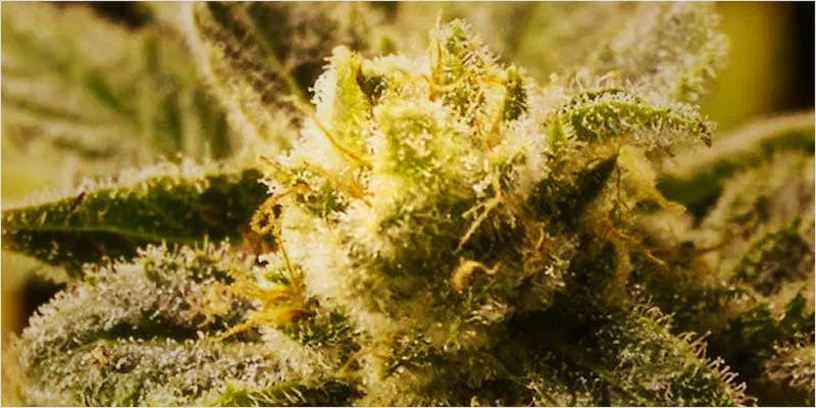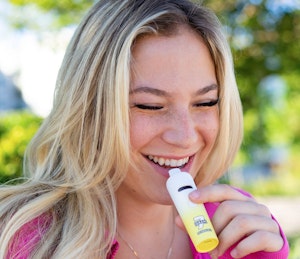
How To Tell Between Male vs Female Marijuana Plants
That’s right, the cannabis plant has distinct sexes. Here’s what’s what when it comes to male vs female plants.
That’s right, the cannabis plant has distinct sexes. Marijuana can be either male or female though in rare instances a hermaphrodite plant can occur. Both the male and female plant produce flowers and each flower has its own unique purpose. Here’s a breakdown of male vs. female marijuana plants.
Female plants

Anyone who has smoked, vaped, or cooked with marijuana has probably consumed the bud of a female plant. One clear sign that a marijuana flower is a lady is the presence of distinguishing white or burnt orange hairs. These hairs are pistils, the plant’s primary female sex organ.
Female marijuana plants will also be coated with a very heavy layer of resin. This thick, sticky resin helps the female flower capture pollen produced by male counterparts.
When pollen reaches the female flower, the female becomes fertilized and begins to produce seed. When the female plant is kept away from pollen, however, it’s resin production kicks into overdrive. Unfertilized females produce the ultra-frosty layer of trichomes that we’ve come to covet for their psychoactive and medical properties.
A flower that’s been kept away from pollen is significantly more potent than a flower that’s been fertilized. It produces more trichomes in an attempt to capture any male pollen that happens to be floating around in the air. If the female plant is fertilized, its energy goes into creating seed rather than growing its bud and producing resin.
An unnamed grower featured in the PBS documentary Botany of Desire explains this process best:
In essence what you’re seeing is extreme sexual frustration. This is a room full of women who are looking for some guy to come by and give them some pollen so they can create seeds. And they try harder and harder as time passes, and the more unsuccessful they are, the more the production of the resins that are intended to attract pollen increases, and that increases the psychoactive elements of the plant.
The unfertilized female flower is known as sinsemilla, meaning “without seed.” When you go into a dispensary and pick up some good bud, you’re purchasing sinsemilla.
Male plants
Female plants produce the large buds or flowers that come to mind when we think about marijuana. A male cannabis plant looks quite different. Rather than a mature flower covered in trichomes, male plants produce dozens of “pollen sacks”.
These pollen sacks look like groups of tiny hanging tulip buds when they’re closed, and they blossom into little whitish/light-green flowers when they reach maturity. Male flowers are actually quite beautiful if you have the opportunity to see them.
Male plants are not as potent as female plants, but they do contain cannabinoids. Back in 1971, the United Nations Office on Drugs and Crime tested the cannabinoid content of male and female plants from different regions around the globe. Male plants contained slightly less THC and CBD on average, but the results were surprisingly close. In one region, male flowers actually had a higher cannabinoid content than flowers on the female plant. The study didn’t take today’s potent sinsemilla into account, however.
Just as human males produce sperm to fertilize female eggs, the male marijuana plant produces pollen to fertilize the bud of a female. These pollen factories are essential for breeders and play a crucial role in maintaining genetic diversity in the marijuana plant.
Pollen contains genetic material, and it’s used to selectively breed new strains of marijuana with specific traits over time. When you take clippings of a female plant and grow them as clones, the clone is an exact copy of the mother plant’s genes. That means that you’re getting the exact same plant with the same phenotypes every time.
Cross-pollinating a male plant with a female plant leads to the creation of seeds containing genetic material from both the mother and father plant. This spurs greater genetic variation and makes the cannabis species stronger overall. While clones are easy to grow, they’re also prone to genetic weakness if you keep propagating from the same genes again and again.
Hermaphrodite plants
Hermaphrodite plants contain both male and female parts. Typically, you’ll see the beginning of a flower that looks like a male pollen sack, but there will be a pistillate hair coming out of the seemingly male bud.
Hermaphrodites typically occur in female plants that have gone a long time without pollination. While this is usually extremely rare, the demand for feminized seeds and unfertilized sinsemilla has increased the likelihood of hermaphroditism in modern plants. Plants grown from feminized seeds are more likely to show this trait.
According to grower Carey Burns (video above), if you open the hermaphrodite pollen sack and pollinate healthy female flower with that pollen, the resulting seeds have a 95% chance of being female.
Male plants can also produce hermaphrodites. But, the seeds that result from hermaphrodites on a male plant are slightly more likely to be male themselves.
While many plants contain both male and female parts, marijuana is unique in that plant sexes are separated. It’s unclear why exactly it has developed this way evolutionarily, but we humans have definitely used this separation to our advantage.
Do you have experience with male, female, or hermaphrodite plants? Anything you’d like to add? Share your thoughts with us on social media or in the comments section below.
Herb Recommended Products:
READ MORE










